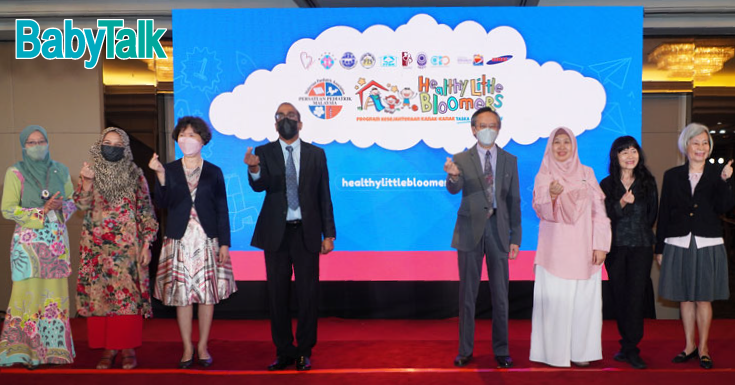Medical and early childhood care & education (ECCE) professionals joined forces to establish a holistic educational programme to promote child health, safety & wellbeing from young through childcare centres and kindergartens nationwide
Speaking at the launch of ‘Healthy Little Bloomers’ programme and the roll-out of its maiden campaign ‘Junior Germ Busters’, YB Tuan Khairy Jamaluddin, the Minister of Health Malaysia, highlighted the importance of promoting, nurturing and safeguarding child health, safety and wellbeing from an early age.
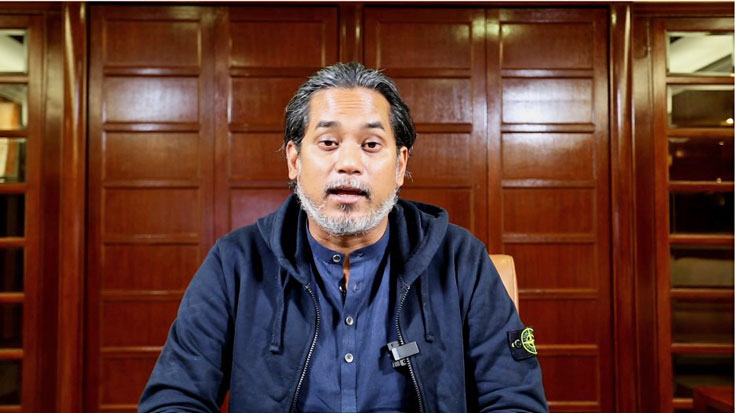
The Healthy Little Bloomers programme is an initiative led by the Malaysian Paediatric Association (MPA) in collaboration with ten (10) prominent early childhood care and education (ECCE) organisations from both private and government sectors. The programme aims to promote child health, safety and wellbeing from young through more than 30,000 ECCE centres nationwide, potentially benefiting more than 800,000 children.
YB Minister of Health in his speech stated that young children especially those under the age of five are vulnerable to health and safety threats such as infectious diseases, injuries, abuse and neglect. Children’s wellbeing at this tender age will have lifelong implications.
Children who are overweight or obese are five times more likely to become overweight and obese adults. Child abuse survivors are at higher risk of becoming abusers or getting involved in abusive relationship during adulthood. Unmet emotional and mental health needs during childhood will lead to difficulties and problems during adolescence and adulthood.
He added “Children are the nation’s future. Therefore, addressing their health, safety and wellbeing needs holistically is one of the government’s key priorities. It has been part of the Malaysian government development goals since the 1960s and outlined in our latest Child Health 2021-2023 national framework”.
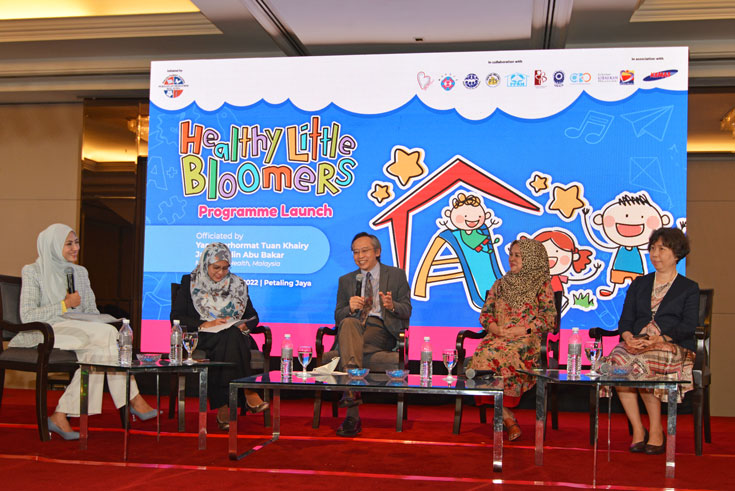
However, the government cannot work in silo. “We believe that success will only come if a whole-of-society approach is adopted” he said. For this reason, intersectoral collaboration has been included as one of the key strategic pillars in the Child Health 2021-2023 national framework. “Thus, why I was delighted to hear about the ‘Healthy Little Bloomers’ (HLB) programme. Not only does the programme promote child health holistically, but it also involves systematic and potentially long-term collaboration between the medical and early childhood care and education (ECCE) sectors”. He applauded MPA and partner ECCE organisations for making it happen.
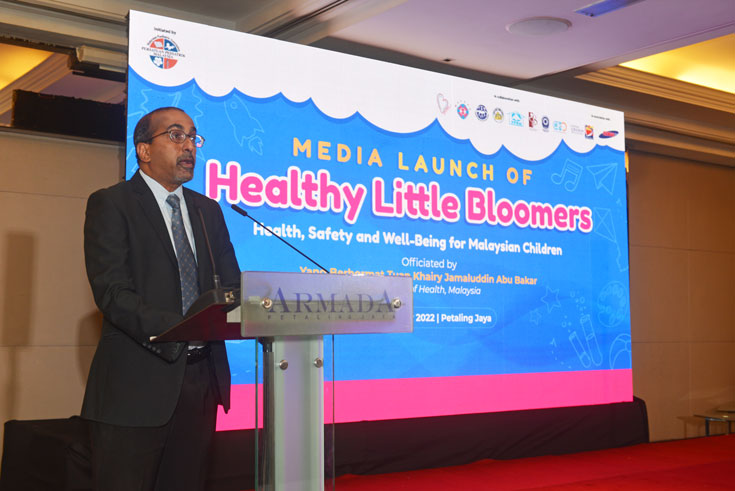
Dr Selva Kumar Sivapunniam, MPA president, Consultant Paediatrican and Paediatric Nephrologist, thanked its ten ECCE partners namely Jabatan Kemajuan Masyarakat (KEMAS), ECCE Council, Malaysian Association of Professional Early Childhood Educators (MAPECE), Persatuan Tadika Malaysia (PTM), Jabatan Kebajikan Masyarakat (JKM), Persatuan Pengasuh Berdaftar Malaysia (PPBM), National Association of Special Education, Malaysia (PPKK), Majlis Kebajikan Kanak-Kanak Malaysia (MKKM), Persatuan Tadika Sabah (PTS) and Association of Kindergarten Operators Sarawak (AKO) for agreeing to work with MPA in the HLB programme.
He added that for many parents, ECCE institutions which include preschool and childcare centres, are the most important partners in safeguarding and nurturing child health, safety and wellbeing. “Many young children spend most of their waking hours in these institutions on a weekly basis. In addition, studies have shown that health promotion intervention in kindergarten and childcare centres can be effective especially if parental engagement is involved”.
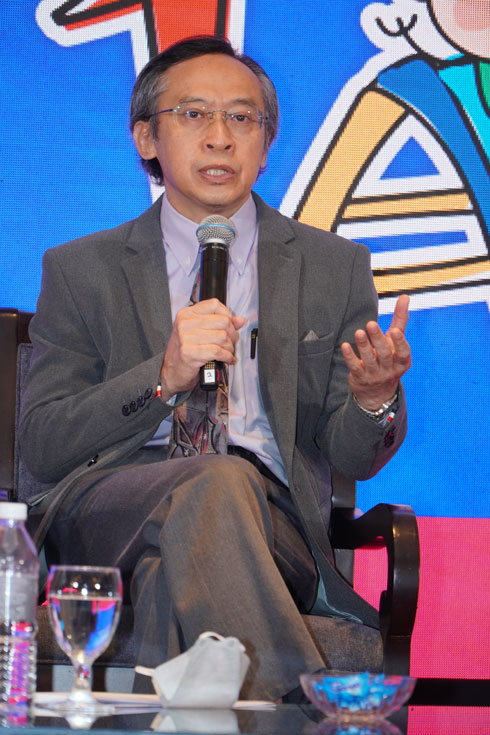
Prof. Datuk Dr Zulkifli Ismail, Chairman of Healthy Little Bloomers, Consultant Paediatrician & Paediatric Cardiologist, emphasised that while the programme’s maiden campaign “Junior Germ Busters” (JGB) focuses on infectious diseases prevention, HLB is meant to be holistic covering all key domains and aspects of child health, safety and wellbeing. The programme will take an annual thematic approach. In subsequent years, new themes such as injury prevention and mental health will be rolled-out while existing campaign (JGB) will be maintained.
Healthy Little Bloomers programme offerings include: 1) trainings for ECCE operators and personnel; 2) fun, exciting and interactive lessons for children; 3) information and educational materials for parents and primary caregivers. The programme is inclusive and will cater to children from various population segments including those who are underprivileged and with special needs. Educational materials will be available in Bahasa Malaysia and English, roadshows will be conducted to cater to less advantaged children and activities will consider the needs of those with hearing or vision impairments. Visit healthylittlebloomers.my and get easy and free access to all “Junior Germ Busters” educational materials.
HLB programme activities under the “Junior Germ Busters” campaign 2022/2023 are supported by an educational sponsorship from Clorox, Pfizer and Takeda.
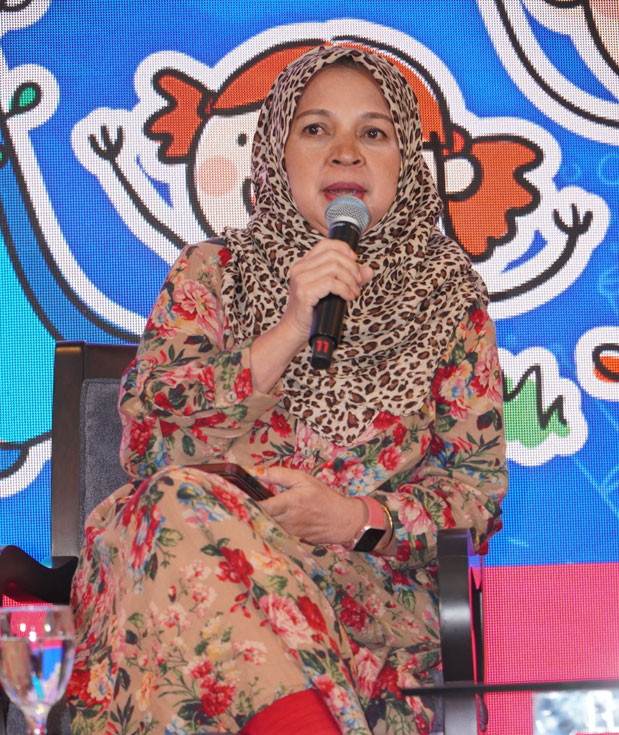
Datin Prof. Dr Mariani Md Nor, President of the ECCE Council and Professor of Early Childhood Education and Psychology at SEGi university, echoed YB Minister of Health’s statement. She said “Early childhood development period – characterised by the first 8 years of life – is when the brain grows most rapidly. These early years of life builds the foundation of future life learnings, health, behaviours and even success. Not only are we responsible in providing children with protection, but also in nurturing health & safety consciousness in them”.
She added, “It is never too early to teach children habits that will help enhance their wellbeing. Infants below the age of two with very limited understanding of verbal communications, learn through observation and experiences. Typically, children between the age of 3 and 4 are already good at understanding simple instructions while children above the age of 4 can start learning through a more structured lessons in class. Parents and ECCE centres personnel involvement are important as educators as well as role models to these children”.
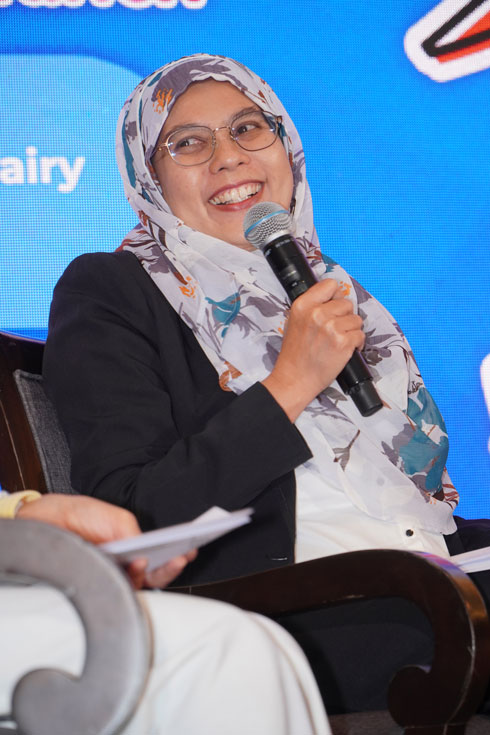
Pn Hamiza Mustapha, Internal Auditor, Persatuan Pengasuh Berdaftar Malaysia emphasised the important role that adults – within a young child’s environment – play in shaping a child’s health and safety habits. “If you are caring for a child below 4 years old, always be mindful that they are watching and will follow your lead. Your habits and behaviours will shape theirs. Therefore, always set a good example to these young minds” she said.
On another note, I am delighted to have JKM as an official collaborator in this initiative. I am also pleased that Kementerian Kesihatan Malaysia (KKM) has appointed representatives to provide expert advise in the development of HLB campaign activities and materials. These government agencies are important partners to us – the childcare centres’ operators, personnel – and parents because they set policies, standard operating procedures (SOPs) as well as provide trainings and latest information that help us shape a healthier and safer environment for children.

Prof Dr Loh Sau Cheong, Honorary Secretary of National Association of Special Education and former Head of Department of Educational Psychology and Counselling, Faculty of Education, Universiti Malaya said that the challenges may differ for parents and caregivers of children with special needs. “Generally there are 6 types of children with special needs, those with hearing impairment, visual impairment, physical disability, learning disabilities such as autism spectrum disorder, down syndrome and ADHD, speech disability and multiple disability and other disability as defined through medical diagnosis. Each type requires specific approaches that are individualised”.
Reports have shown that children with disabilities are more prone to health problems as compared to other children. Comorbidities that are related to physiological or mental health are also common among these children. She added, “Thus, it is important that parents seek professional help and guidance to minimise risk on children with special needs so that they can reach their optimum potential. We are also quite fortunate because in Malaysia, there are ECCE centres with trained personnel that cater to children with special needs”. However, she believes that such ECCE centres are still very limited and not accessible to many, especially underprivileged families. “I am however glad that the HLB programme is attempting to address children with special needs. Producing materials that are friendly to children with visual or hearing impairment will be a good start.”


